
Marcus Velleius Paterculus was a Roman historian, soldier and senator. His Roman history, written in a highly rhetorical style, covered the period from the end of the Trojan War to AD 30, but is most useful for the period from the death of Caesar in 44 BC to the death of Augustus in AD 14.

Publius Quinctilius Varus was a Roman general and politician under the first Roman emperor Augustus. Varus is generally remembered for having lost three Roman legions when ambushed by Germanic tribes led by Arminius in the Battle of the Teutoburg Forest, whereupon he took his own life.

Publius Cornelius Scipio Africanus Aemilianus, primarily known as Scipio Aemilianus, was a Roman general and statesman noted for his military exploits in the Third Punic War against Carthage and during the Numantine War in Spain. He oversaw the final defeat and destruction of the city of Carthage. He was a prominent patron of writers and philosophers, the most famous of whom was the Greek historian Polybius. In politics, he opposed the populist reform program of his murdered brother-in-law, Tiberius Gracchus.
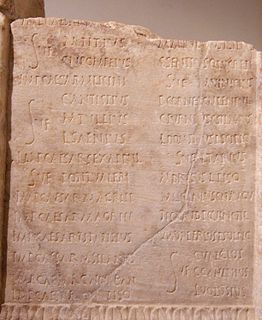
The gens Aemilia, originally written Aimilia, was one of the greatest patrician families at ancient Rome. The gens was of great antiquity, and claimed descent from Numa Pompilius, the second King of Rome. Its members held the highest offices of the state, from the early decades of the Republic to imperial times. The Aemilii were almost certainly one of the gentes maiores, the most important of the patrician families. Their name was associated with two major roads, an administrative region of Italy, and the Basilica Aemilia at Rome.
Res Gestae Divi Augusti is a monumental inscription composed by the first Roman emperor, Augustus, giving a first-person record of his life and accomplishments. The Res Gestae is especially significant because it gives an insight into the image Augustus offered to the Roman people. Various portions of the Res Gestae have been found in modern Turkey. The inscription itself is a monument to the establishment of the Julio-Claudian dynasty that was to follow Augustus.

The Mithridatic Wars were three conflicts fought by Rome against the Kingdom of Pontus and its allies between 88 BC and 63 BC. They are named after Mithridates VI, the King of Pontus who initiated the hostilities after annexing the Roman province of Asia into its Pontic Empire and committing massacres against the local Roman population known as the Asian Vespers. As Roman troops were sent to recover the territory, they faced an uprising in Greece organized and supported by Mithridates. Mithridates was able to mastermind such general revolts against Rome and played the magistrates of the optimates party off against the magistrates of the populares party in the Roman civil wars. Nevertheless, the first war ended with a Roman victory, confirmed by the Treaty of Dardanos signed by Lucius Sulla and Mithridates. Greece was restored to Roman rule and Pontus was expected to restore the status quo ante bellum in Asia Minor.

Julia the Elder, known to her contemporaries as Julia Caesaris filia or Julia Augusti filia, was the daughter of Augustus Caesar, the first Roman Emperor, and his second wife, Scribonia. Julia was also stepsister and second wife of the Emperor Tiberius; maternal grandmother of the Emperor Caligula and the Empress Agrippina the Younger; grandmother-in-law of the Emperor Claudius; and maternal great-grandmother of the Emperor Nero. Her epithet 'the Elder' distinguishes her from her daughter, Julia the Younger.
The Charudes or Harudes were a Germanic group first mentioned by Julius Caesar as one of the tribes who had followed Ariovistus across the Rhine. While Tacitus' Germania makes no mention of them, Ptolemy's Geographia locates the Charudes (Χαροῦδες) on the east coast of the Cimbrian peninsula. Their name suggests that they may have at one point settled in east jutland and founded the city of Charudes.
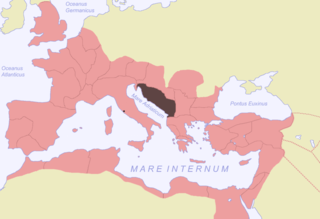
Illyricum was a Roman province that existed from 27 BC to sometime during the reign of Vespasian. The province comprised Illyria/Dalmatia and Pannonia. Illyria included the area along the east coast of the Adriatic Sea and its inland mountains. With the creation of this province it came to be called Dalmatia. It was in the south, while Pannonia was in the north. Illyria/Dalmatia stretched from the River Drin to Istria (Croatia) and the River Sava in the north. The area roughly corresponded to modern northern Slovenia, Serbia, Albania, Montenegro, Bosnia and Herzegovina and coastal Croatia. Pannonia was the plain which lies to its north, from the mountains of Illyria/Dalmatia to the westward bend of the River Danube, and included modern Vojvodina, northern Croatia and western Hungary. As the province developed, Salona became its capital.

The Forum of Augustus is one of the Imperial fora of Rome, Italy, built by Augustus. It includes the Temple of Mars Ultor. The incomplete forum and its temple were inaugurated in 2 BC, 40 years after they were first vowed.
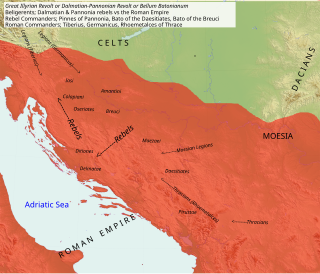
The Bellum Batonianum was a military conflict fought in the Roman province of Illyricum in the 1st century AD, in which an alliance of native peoples of the two regions of Illyricum, Dalmatia and Pannonia, revolted against the Romans. The rebellion began among native peoples who had been recruited as auxiliary troops for the Roman army. They were led by Bato the Daesitiate, a chieftain of the Daesitiatae in the central part of present-day Bosnia, and were later joined by the Breuci, a tribe in Pannonia led by Bato the Breucian. Many other tribes in Illyria also joined the revolt.
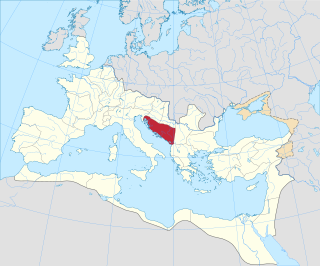
Dalmatia was a Roman province. Its name is derived from the name of an Illyrian tribe called the Dalmatae, which lived in the central area of the eastern coast of the Adriatic Sea. It encompassed the northern part of present-day Albania, much of Croatia, Bosnia and Herzegovina, Montenegro, Kosovo and Serbia, thus covering an area significantly larger than the current Croatian region of Dalmatia. Originally this region was called Illyria or Illyricum.
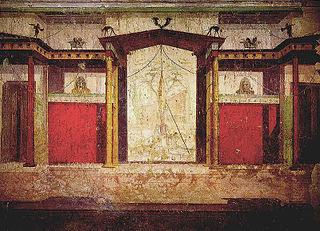
The House of Augustus, or the Domus Augusti, is situated on the Palatine Hill in Rome, Italy. This house has been identified as the primary place of residence for the emperor Augustus.
The gens Caecinia was a plebeian family of Etruscan origin at ancient Rome. Members of this gens are first mentioned in the time of Cicero, and they remained prominent through the first century of the Empire, before fading into obscurity in the time of the Flavian emperors. A family of this name rose to prominence once more at the beginning of the fifth century. The poet Decius Albinus Caecina flourished during the reign of Honorius.
The gens Cestia was a plebeian family at ancient Rome during the later Republic, and in imperial times. The first member of the gens to obtain the consulship was Gaius Cestius Gallus in AD 35. The family's name is commemorated on two monuments, the Pons Cestius and the Pyramid of Cestius which survive into modern times.
The gens Coruncania was a plebeian family at ancient Rome. The first of the family to come to prominence was Tiberius Coruncanius, a novus homo who became consul in 280 BC, and dictator in 246.
The gens Perperna, also found as Perpenna, was a plebeian family at ancient Rome. Members of this gens first appear in history during the second century BC, and Marcus Perperna obtained the consulship in 130 BC.
The gens Pontilia was an obscure plebeian family at ancient Rome. Hardly any members of this gens appear in history, but a number of them are mentioned in inscriptions.

The gens Burbuleia, occasionally written Burboleia, was an obscure plebeian family at ancient Rome. Members of this gens are mentioned in the time of Cicero, but the only one who achieved any distinction in the Roman state was Lucius Burbuleius Optatus, consul in AD 135.
The gens Rupilia, occasionally written Rupillia, was a minor plebeian family at ancient Rome. Members of this gens are first mentioned in the latter part of the Republic, and Publius Rupilius obtained the consulship in 132 BC. Few others achieved any prominence, but the name occurs once or twice in the consular fasti under the Empire. The name is frequently confounded with the similar Rutilius.











